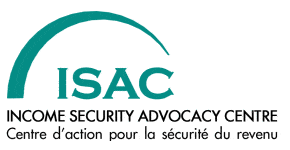This UV continuing series looks at different legal clinics in Ontario. Legal clinics are a central pillar of access to justice in Ontario. Mary Marrone, the Director of Advocacy and Legal Services at the Income Security Advocacy Centre (ISAC) spoke with UV about the services that her clinic provides and why it is great to work on appellate-level human rights cases.
 ISAC is a specialty clinic that works to improve Ontario’s income security regime. Ontario Works, the Ontario Disability Support Program and Employment insurance make up the social safety net for those who aren’t able to fully support themselves through employment. They work primarily at the appellate level but more and more of this work is being done at the Human Rights Tribunal or through constitutional and Charter cases. The cases that they normally look for are any that will likely result in a systemic remedy.
ISAC is a specialty clinic that works to improve Ontario’s income security regime. Ontario Works, the Ontario Disability Support Program and Employment insurance make up the social safety net for those who aren’t able to fully support themselves through employment. They work primarily at the appellate level but more and more of this work is being done at the Human Rights Tribunal or through constitutional and Charter cases. The cases that they normally look for are any that will likely result in a systemic remedy.
Most of their cases come to them via other legal clinics. By partnering with ISAC the local clinic can continue to provide in-person service to the client, while ISAC is able to focus on the legal arguments on appeal.
Who do they serve?
ISAC takes cases from all over Ontario and the results from decisions they receive set precedents more often than not. Recently they have worked to secure parental benefits for migrant workers and to increase access to the allowance ODSP recipients get if they need a special diet. This latter case was effectively a class action involving 180 claimants. This decision forces the government to fully fund the costs of special diets based on medical evidence and has led to an extra investment of over nineteen million dollars in the program over two years.
One of the remarkable things about ISAC is that they have a government mandate, and government money, to challenge the government. In the process of developing their cases, they have also developed significant expertise in human rights law.
Who works at the clinic?
ISAC has three lawyers and a paralegal on staff. In addition to their litigation work, ISAC is also deeply involved in grassroots advocacy and the organization employs a research and policy analyst, and a provincial organizer to make sure low income voices are heard on the topic of social assistance reform.
The social advocacy program recently won a victory. Just before the winter holiday the Province reinvested $42 million dollars into municipalities to partially restore funding lost when the community start-up benefit was eliminated. This is money which helps people get and maintain housing. This action, the government said, was in part a result of ISAC’s advocacy.
Articling?
There is no typical articling experience at ISAC. What makes the experience valuable is that students work directly with senior counsel on complex appellate litigation. Although much of the work is high level, articling students also can have the chance of arguing in front of the Human Rights Tribunal
While ISAC does not have consistent funding for articling students they are developing their student program and they welcome law student volunteers. ISAC is constantly working on how to enhance the experience their students get and to ensure that their contribution is valuable.
Why is ISAC a great place to work?
Ms. Marrone says that “it is incredibly rewarding to have a direct impact on large numbers of people” through doing work that has system-wide impact. While ISAC lawyers don’t get to serve individual clients or go through files quickly, like other clinic lawyers can, their victories apply to a lot of people at a time.
The other reason why it is great to practice law at ISAC is that ISAC does interesting, high quality work that gives voice to those who typically don’t have a voice with government
Challenges?
The challenge with doing clinic work is that there are never the resources to respond to everything they would like to respond to. This situation won’t change any time soon because Legal Aid Ontario, like other organizations, is not projecting much revenue growth.
In response to this challenge, clinics are pro-actively looking for ways to save while protecting the services and work they engage in.
This search has led legal clinics to start province-wide strategic planning to determine how to work more effectively as a system. ISAC is actively engaged in this process because so much of their work is already tied up with the work of other clinics and their partnership with local clinics will continue to be critical. Some of this provincial planning and coordination is already being done through networks like the Steering Committee on Social Assistance, which pulls together the experience at the front lines with ISAC’s expertise to determine the key issues that require attention for legal, political and bureaucratic action.
What should University of Toronto law students know about ISAC?
ISAC works on social assistance, which affects a huge number of people and is at the core of what general legal clinics do. ISAC shares an office with the Advocacy Centre for Tenants Ontario, and the Association of Community Legal Clinics of Ontario creating great opportunities for working together.
Even though the law they do is very deep level stuff, they remain connected to the people they serve. One third of their Board of Directors is made up of people who identify as low income and another third are legal aid case workers from around the province. ISAC also lends its space to low income groups on a regular basis.





